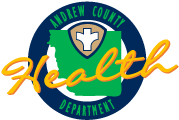
As a way to support local breastfeeding moms during World Breastfeeding Week, the Andrew County Health Department is partnering with Lens Photography, a local photographer, for the third year in a row. We will provide a FREE 10 minute breastfeeding photo session to each participating mom. They will also receive a t-shirt, a reusable shopping bag filled with information, samples, and coupons, 5 fully edited pictures, and an 8x10 of their favorite image at no cost to them.
Frequently Asked Questions:
Q: What about social distancing and COVID-19?
A: Since our photo shoot is planned for August, we're hoping that the social distancing measures currently in place will no longer be necessary. But we are also aware of the far reaching effects the virus can have, and realize that this may not be possible.
However, because of the nature of the shoot, we will be able to implement social distancing measures with relative ease. The shoot will take place outside at Duncan Park, which will make maintaining a 6 foot distance between everyone easy. The appointments are staggered, and the possibility of serving more than 6-10 people at once is pretty low. And if necessary, masks will be worn by Nicole and Lindsey during the duration of the shoot.
Q: All the appointment time slots are gone! Can I be put on a wait-list?
A: Yes! If you were unable to book a time, please email Nicole Parsons as nicolep@andrewcountyhealth.com. You will be put on a waiting list in the order names were received, and you will be notified if a spot opens up.
Q: Can I reschedule if something comes up?
A: If you're suddenly unable to make it to your appointment, please email Nicole Parsons at nicolep@andrewcountyhealth.com as soon as you can. If we still have time slots available, you will be given the option to reschedule. If we no longer have time slots open, you can request to be added to our waiting list as you'll be notified if something becomes available for you.
Q: What happens if I need to cancel?
A: We really hope this doesn't happen, but if you need to cancel your appointment, please notify Nicole Parsons at nicolep@andrewcountyhealth.com as soon as you can. This way another mom on the waiting list can be given the opportunity to take your spot if she can.
Q: How early should I arrive?
A: Please arrive about 10 minutes early, if at all possible. We have a lot of appointments, and we want to make sure everyone gets their promised amount of time.

Q: Where will the pictures be taken?
A: The pictures will be taken outside at Duncan Park in Savannah, MO. Be sure to check the weather on the day of your appointment to make sure you’ll both be comfortable. The backdrop is set up in near a shelter house at the park, so it won’t be completely private, but it should be discreet enough for you to nurse comfortably.
Q: Will you provide us with anything to have in the pictures with us?
A: We are not providing any props (unless you want to bring your pump along, we have a table we can use for those pictures). So if you want anything in the pictures with you, bring it to the shoot.
Q: What does the backdrop look like?
A: We've chosen a spot with trees and greenery. You’ll have the option of nursing on a blanket on the ground, or sitting on a pretty little sitting couch, whichever will be more comfortable for you. The couch is patterned with red, orange, and yellow flowers, so you might want to plan your outfit around that.

Q: Do we need to wear the t-shirts and onesies we receive at the event?
A: If you registered early enough, you will be getting a free t-shirt and onesie, but they are not required for the photo shoot. You’re free to wear whatever you’d like.
Q: Can I bring my older kids?
A: Older children are welcome! They can be in the pictures with you.
Q: What about my husband/boyfriend/fiancé?
A: We love to see men supporting the women and children in their lives, and we'd love to include them in the pictures, too!
Q: How will I get my pictures and choose my favorite?
A: Make sure you check your email in the days following the shoot. Lindsay of Lens Photography will be emailing you your edited pictures, and communicating with you about which picture you’d like printed as an 8x10.
Q: How long will it take to get my pictures and my printed 8x10?
A: Keep in mind that Lindsey will be taking pictures of around 60 moms and babies this year! That's an amazing outreach, but it also takes a lot of time and energy to finish the edits and produce professional results. You can expect to receive your edited pictures within 4 weeks of your appointment. Once you've looked at your pictures, you'll let her know which one you'd like printed as an 8x10, and she will compile a folder to send to Nicole. You can expect to have your 8x10 in the mail by mid-September. Thank you for understanding and appreciating all the work Lindsey puts into this shoot!
Q: Can I get extra t-shirts or onesies?
A: Every participant will receive one free t-shirt and one free onesie. Extra shirts or onesies are $9 each, and when you book your photo appointment, there will be a place to indicate what sizes and how many you'd like. Please bring the payment for the extra to the shoot with you.






